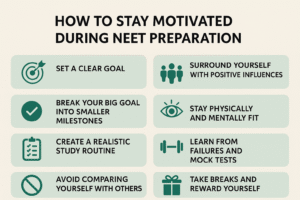Introduction
Preparing for NEET (National Eligibility cum Entrance Test) is one of the most challenging academic journeys in India. Each year, lakhs of students compete for limited medical seats, but only a fraction succeeds. One key reason is that many aspirants unknowingly repeat common mistakes during their NEET preparation.
Identifying and avoiding these mistakes early can save time, reduce stress, and significantly improve your score. In this guide, we will cover the top 5 mistakes NEET aspirants make and share actionable tips to overcome them.
1. Ignoring NCERT Textbooks
Why it’s a mistake
Many students spend excessive time on reference books and coaching materials, ignoring NCERT textbooks. However, over 80-85% of NEET questions are directly or indirectly based on NCERT, especially in Biology and Chemistry.
How to avoid it
Make NCERT your primary study material for Biology and Chemistry.
Revise NCERT multiple times.
Highlight key lines and diagrams.
Use reference books only for additional practice, not as a replacement.
2. Not Practicing Enough Mock Tests
Why it’s a mistake
Students often focus only on reading and notes but fail to practice time-bound mock tests and previous years’ papers. As a result, they struggle with time management and exam pressure.
How to avoid it
Schedule regular full-length mock tests every 1-2 weeks.
Solve previous 10 years’ NEET question papers.
Simulate real exam conditions: timed tests without breaks.
Analyze your mistakes after each test and improve weak areas.
3. Poor Time Management and Inconsistent Routine
Why it’s a mistake
NEET preparation requires consistent daily effort over a long period. Many aspirants study irregularly or leave too much for the last few months.
How to avoid it
Create a realistic timetable covering syllabus completion, revision, and practice.
Stick to a daily study schedule of 6–8 focused hours.
Prioritize difficult topics early in the preparation phase.
Use tools like planners or apps to track progress.
4. Ignoring Revision
Why it’s a mistake
Some students feel that studying a topic once is enough. However, without regular revision, you will forget important concepts and formulas.
How to avoid it
Allocate at least 25–30% of your weekly study time to revision.
Revise Biology diagrams and Chemistry reactions frequently.
Maintain short notes and flashcards for quick reviews.
Revise every topic multiple times before the exam.
5. Neglecting Health and Well-being
Why it’s a mistake
Continuous study without proper sleep, nutrition, or exercise can lead to burnout, stress, and lack of focus. Many aspirants fall into this trap and compromise their performance.
How to avoid it
Get at least 7 hours of sleep every night.
Eat balanced meals and stay hydrated.
Take short breaks between study sessions.
Practice relaxation techniques like deep breathing or meditation.
Quick Recap: The Top 5 NEET Preparation Mistakes
Ignoring NCERT textbooks
Not practicing enough mock tests
Poor time management and inconsistency
Skipping revision
Neglecting health and self-care
Avoiding these mistakes can dramatically improve your NEET preparation strategy and boost your confidence.
Conclusion
NEET is not only a test of knowledge but also of planning, consistency, and self-discipline. By understanding the common pitfalls and taking proactive steps to avoid them, you set yourself apart from thousands of aspirants who make these errors every year.
Remember: It’s never too late to correct your approach. Start today, stay committed, and believe in yourself.
FAQs on Common NEET Preparation Mistakes
Q1. Can I rely only on reference books instead of NCERT?
No. NCERT should be your main study resource, especially for Biology and Chemistry. Reference books are useful only for additional practice and clarity.
Q2. How often should I take mock tests during NEET preparation?
Ideally, one mock test every 1–2 weeks in the early phase, and 2–3 tests per week during the last 2–3 months before NEET.
Q3. Is it okay to skip revision if I have studied everything once?
No. Revision is essential to retain information. Without revising, you will forget most of what you have studied.
Q4. How can I improve my time management for NEET?
Create a daily timetable, set clear targets, avoid distractions, and track your progress consistently.
Q5. What can I do to avoid stress and burnout during NEET preparation?
Maintain a balanced lifestyle: eat healthy, sleep well, take regular breaks, and practice relaxation techniques.









